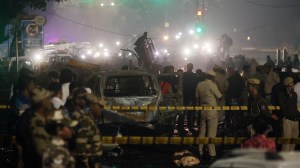Public drives circles around city traffic policemen
VADODARA, Sept 29: If petty thieves are outsmarting the police force in suburban Vadodara (see Express Newsline, September 29), it is the...

VADODARA, Sept 29: If petty thieves are outsmarting the police force in suburban Vadodara (see Express Newsline, September 29), it is the general public that is running circles around their counterparts in the city itself. Few drivers today seem to be have a clue about traffic rules; their ignorance is perhaps paralleled only by the traffic police’s total bewilderment on how to handle the situation.
Violation of traffic rules is a deed that cuts across barriers of class and education. Consider the following incident, which occurred at the Dairy Den crossing in Sayajibaug on September 14, the day the police were experimenting with a traffic diversion.
Even as other drivers were being waved down and directed on their way, a civil servant zoomed by, disregarding the traffic constable’s signal to halt. Though this particular offender was chased, caught and let off after an apology, it was by no means a stray incident.
Just the other day, at Kalaghoda, a luxury bus rushed through the traffic lights at breakneck speed, “overlooking” the frantic signals of the constable on duty, who was waving through traffic from the opposite side. The driver, Salim Gaffar Khan Memon, did everything to cause an accident, but avoided one by the skin of his teeth. The police finally caught up with him near the railway station; he was challaned and his driving licence confiscated.
Despite these deterrent actions, violations abound, indicating the depth of the cancer. An impossible traffic jam on the Lehripura Main Road a one-way street on September 16 had the police despairing of ever untangling it. After wading through the packed up cars, the traffic policemen discovered an auto-rickshaw had turned in on the road from the wrong side, disconcerting scores of vehicle-drivers.
The ubiquitous black-and-yellow three-wheelers are often the chief culprit of traffic disorders. Nausherkhan Kamrakhan Pathan, the driver of one, parked his vehicle near Hirakbaug and went off to attend to some work. What he didn’t realise — or perhaps disregarded — was that no parking was allowed on the narrow roads. The fallout was predictable: a traffic jam that took hours to unravel.
But the onus for maintaining traffic discipline can’t lie entirely with the public. As soon as the focus shifts to the other side of the equation, a very peculiar fact emerges: Vadodara has only one policeman — head constable Mohammed Sadiq Malik — trained in traffic management.
How come none of the 267 others have been trained in traffic matters? Assistant Commissioner of Police A R Munshi says it because there are no traffic training institutes in Gujarat. “And men can’t be spared to attend school in Maharashtra because of the staff-shortage and the ever-increasing workload”, he pleads.
While Munshi agrees “traffic management is difficult with untrained personnel”, another senior police official ridicules the practice of transferring men from one department to another. “Handling traffic, after all, requires specialised training. This practice is a major minus point for the Gujarat police”, he adds.
Malik, the only constable qualified to comment on traffic by virtue of his training and a 20-year stint in the department, however, lays the blame squarely on the public. “No one stops at zebra crossings; they even try to disregard red lights. Two-wheelers snake through two and three-wheelers in a jam and stop in the path of oncoming traffic”, he says.
“Youngsters and even older people try to accelerate even as the signal is changing. This leads to mishaps, sometimes even serious ones, and traffic jams”, Malik says.
There are other flaws as well in the public demeanour. Traffic inspector R A Munshi accuses people of violating one-way roads simply to avoid driving an extra furlong or so. “And when we reprimand them, we are shouted at”, he fumes.
“Three people get on to mopeds that shouldn’t be carrying even two persons; cyclists enter lanes of motorised traffic, slowing up movement. Auto-drivers actually give signals with their feet!”, exclaims ACP Munshi.
Though the traffic department does collect fines from violators, the police thinks the department ends up paying too high a price anyway. And that is why the ACP wants traffic education to be included in primary school syllabi. After all, there’s nothing like catchin’ them young!







- 01
- 02
- 03
- 04
- 05
























